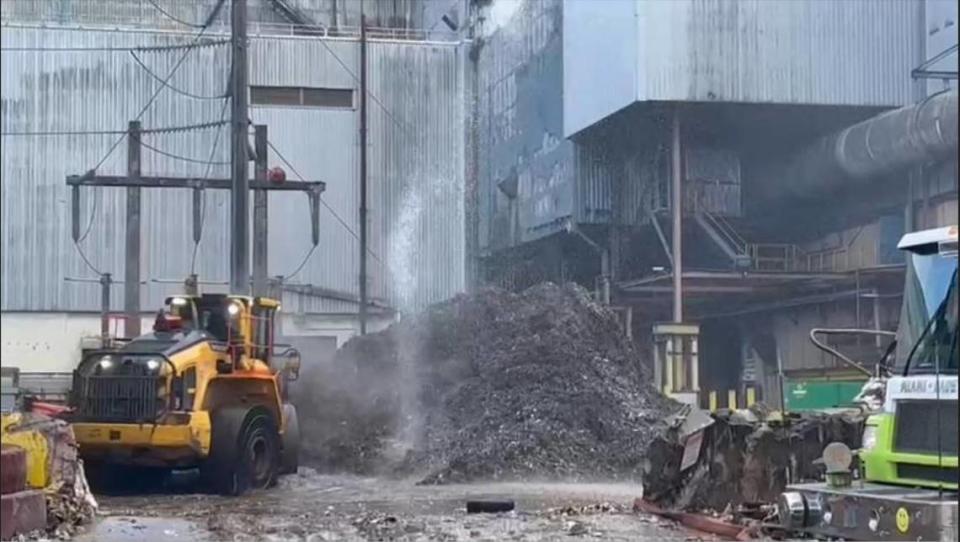‘Trash trains’ to Georgia could be Miami-Dade’s garbage plan
- Oops!Something went wrong.Please try again later.
- Oops!Something went wrong.Please try again later.
Running out of landfill space at home, Miami-Dade County is considering a faraway solution for disposing of its trash: paying a company to haul garbage by rail across state lines.
“They’re looking to ‘train’ waste all the way up to Georgia,” Jimmy Morales, the county’s chief operations officer, told Miami-Dade commissioners on Wednesday about a potential deal with American Waste Services, a company with an office in Opa-locka. “We want to make sure, from a cost perspective, that it makes sense.”
Negotiations over “trash trains” are part of a larger effort to find new destinations for the roughly 1 million tons of garbage, yard debris and other waste that Miami-Dade used to burn each year at the county’s incinerator plant in Doral. When the incinerator was damaged in a massive fire in February 2023, the county was forced to shift almost all of the garbage burned there to private landfills in Miami-Dade and elsewhere in Florida.
READ MORE: Mayor wants Doral trash incinerator to stay closed after fire, rebuild near Everglades
Although some of that waste has ended up in the county’s government-run landfills in the Miami Gardens area and near Cutler Bay, the two locations are forecast to run out of space within the next five years.
The problem could have larger impacts for the county because of a state law about waste limits. Without contracts to dump garbage in private landfills to compensate for the shuttered incinerator, Miami-Dade risks a moratorium on new construction under Florida rules that require counties to show they can dispose of their population’s solid waste for at least five years into the future. If Miami-Dade doesn’t have enough space for its trash, developers can’t get clearance to break ground on new projects.
While trains are one option to dispose of the trash that Miami-Dade once burned in Doral, the county currently is counting on private landfills closer to home to keep trash trucks rolling.
After Miami-Dade Mayor Daniella Levine Cava opted not to resume partial operations at the Doral incinerator, her administration secured agreements from landfill operators Waste Management and Waste Connections to take in about 75% more trash than was allowed under their existing county contracts.
The short-term deals, which expire next year, give Miami-Dade an additional 1 million tons of capacity in private landfills as close as Medley and as far away as St. Cloud, home of a Waste Connections dump in Central Florida.
For the more than 350,000 households who rely on county sanitation trucks for twice-weekly trash pickups, the new deals could mean higher fees.
The Levine Cava administration hasn’t secured updated pricing for the agreements needed in 2025, with the train option providing a potential alternative if Waste Management and Waste Connections want too much money.
“When we are we going to see ... how much it costs us?” Raquel Regalado, a Miami-Dade commissioner, asked Wednesday.
Morales didn’t have cost estimates, but he said in an interview he expected money saved from the incinerator’s $60 million operating budget to cover higher landfill expenses in the coming years.
“I don’t think it will affect rate payers,” he said.
While the county’s deals with Waste Management and Waste Connections currently involve Florida landfills, Morales said out-of-state train shipments are under consideration with those companies, too.
“Waste on rail, I guess,” he said. “Both of them are now also very interested in ‘trash trains.’”

After the incinerator fire, Levine Cava’s senior staff collaborated on a draft memo encouraging county commissioners to reopen the part of the Doral facility that burned yard waste, furniture and other debris, according to emails and documents obtained by the Miami Herald through a records request.
“The Trash Processing Building did not receive the brunt of the damage and could potentially be put back online for partial operation,” read the draft memo circulated June 13 among senior advisers, including Morales. The memo said partially reopening the incinerator “will help alleviate what we are currently sending to landfills.”
One of the authors was Mike Fernandez, the county’s Solid Waste director at the time. He resigned two weeks later in a break with Levine Cava and publicly urged Miami-Dade to partially reopen the incinerator in his departure letter.
Fernandez, now a vice president at the private trash company Waste Pro, told a trade publication in August that he didn’t want the county dependent on private landfill operators because of their ability to increase fees long-term.
“The last thing you want is to depend on distant landfills to be exporting your waste,” he told Waste Dive.
The reopening language in the draft memo never reached commissioners. In August, Levine Cava issued the final version of the memo, calling the reopening option too costly, based on a consultant report submitted after Fernandez’s July 3 resignation.
Arcadis, a county consulting firm specializing in solid waste, recommended against a partial reopening of the Doral facility after Fernandez left, calling the $94 million repair cost “difficult to justify” in an August report. That month, Levine Cava recommended commissioners close the facility, and the board later agreed.

